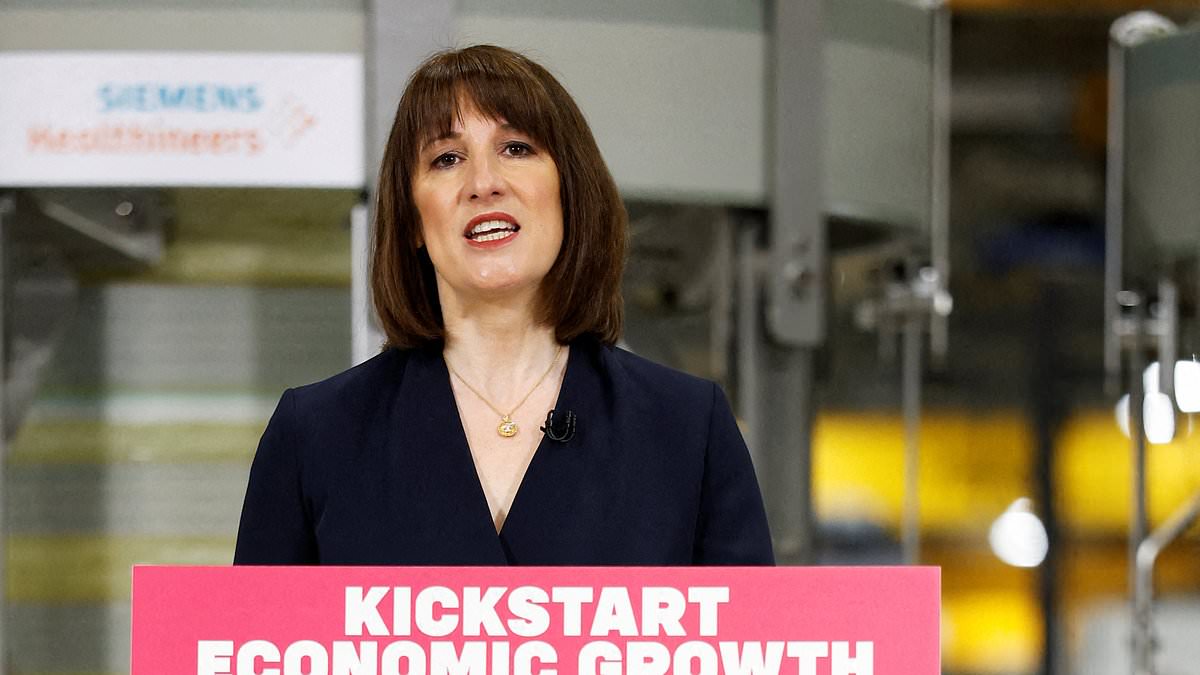The Bank of England cut interest rates today as it bids to revive the stalling economy and warned of mounting ‘uncertainty’ around the world.
The Monetary Policy Committee voted by 7-2 to reduce the level from 4.75 per cent to 4.5 per cent.
That is the lowest point in more than 18 months – giving mortgage-payers much-needed breathing space.
Two members wanted a bigger 0.5 percentage point reduction, underlining the extent of alarm about the economic slowdown in the UK after Rachel Reeves’ huge Budget tax raid.
The Bank said inflation has eased more slowly than hoped, and will increase ‘materially’ in the first half of this year – with energy costs, water bill surge and the national insurance rise blamed.
In a dramatic shift, growth forecasts have been halved for for this year from 1.5 per cent to 0.75 per cent, although it is due to pick up later.
The Treasury’s OBR watchdog pencilled in a figure of 2 per cent at the time of the Budget in October.
The need to kickstart activity has outweighed fears that Donald Trump’s trade tariffs will put upwards pressure on inflation – something Threadneedle Street uses interest rates to counter.
The Chancellor has been scrambling to find policies that can drive growth, but businesses have warned they face cutting jobs and pushing up prices after her national insurance hike.
There are also concerns that stuttering growth means Ms Reeves will have to increase the burden again or cut public spending to balance the books in the coming months.
The FTSE 100 hit a new record high on the interest rates news, although the Pound fell sharply against the dollar.
Bank Governor Andrew Bailey said the cut will be ‘welcome news to many’ but the MPC is ‘monitoring the UK economy and global developments very closely, and taking a gradual and careful approach to reducing rates further’.
‘It will be welcome news to many that we have been able to cut interest rates again today,’ he said.
‘We’ll be monitoring the UK economy and global developments very closely, and taking a gradual and careful approach to reducing rates further.
‘Low and stable inflation is the foundation of a healthy economy and it’s the Bank of England’s job to ensure that.’
Ms Reeves said: ‘This interest rate cut is welcome news, helping ease the cost of living pressures felt by families across the country and making it easier for businesses to borrow to grow.
‘However, I am still not satisfied with the growth rate. Our promise in our Plan for Change is to go further and faster to kickstart economic growth to put more money in working people’s pockets.
‘That’s why we are taking on the blockers to get Britain building again, ripping up unnecessary regulatory barriers and investing in our country to rebuild roads, rail and vital infrastructure.’
Shadow chancellor Mel Stride said: ‘Sadly their disastrous Budget is likely to mean fewer rate cuts this year than previously anticipated.
‘Under new Leadership, the Conservatives will back business and our nation of entrepreneurs to create jobs and wealth. That is the only way to grow our economy so everyone can have a more secure future.’
Efforts to combat skyrocketing inflation have left interest rates much higher than was normal in the aftermath of the credit crunch.
The base rate rose as high as 5.25 per cent in late 2023, but the Bank’s policymakers cut it to 4.75 per cent over the course of several months last year.
The last time the rate was set at 4.5 per cent was in May 2023.
The Bank typically raises interest rates when inflation is high to discourage people from spending money, thereby slowing the rate of price rises.
Inflation is now significantly below the highs of recent years, at 2.5 per cent per year.
However, Mr Trump’s threats of tariffs against major trading partners, including China, have raised concerns of a global trade war that could drive up prices sharply.
Suren Thiru, ICAEW Economics Director, said: ‘This decision confirms that UK interest rates are firmly locked onto a downward trajectory, providing a much-needed fillip to consumers battling with high mortgage costs and businesses still reeling from a painful budget.
‘While this cut may lift morale, it is unlikely to sufficiently alleviate the challenging financial position faced by many people and businesses, as only slight inroads have been made into reversing the previous period of significant rate hikes.
‘The unanimous decision to loosen policy suggests that concerns among rate setters over the UK’s struggling economy are currently outweighing worries over rising inflation, opening the door for another rate cut sooner rather than later.’
Yesterday, a survey of companies in the service sector, which includes everything from shops and pubs to finance firms and lawyers, found that cost inflation in the industry nudged up in January.
Most economists think these signs of rising inflation are unlikely to put policymakers off cutting rates today, but it could lead them to be more cautious at future meetings in March and May.
The rise in cost inflation is partly to do with the effect of policies announced at the October Budget.
Chancellor Ms Reeves raised national insurance contributions for companies in October.
The move was designed to give the Government more money to spend on public services like the NHS.
But some companies have complained it is pushing up costs and contributing to rising inflation.
